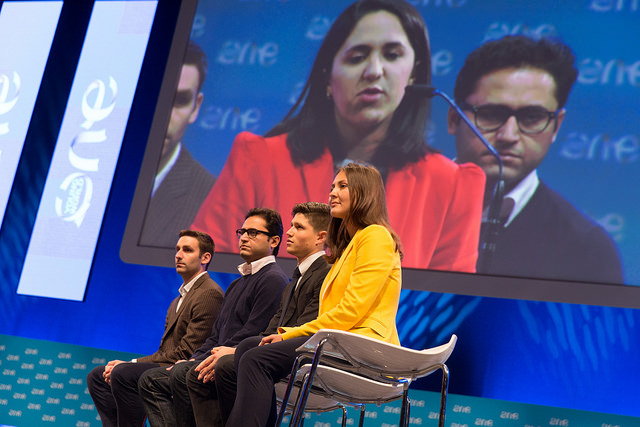The One Young World Summit hosted an intriguing competition this afternoon in partnership with the Rwanga Foundation and School for Startups. Five finalists presented their entrepreneurial credentials of their particular companies in the hopes of being one of the three social start-ups awarded $20,000 of seed capital. This money will then be used to develop the idea, to bring it to a wider market and/or to market it effectively to secure its success.
In keeping with the Dragon’s Den feel, the judging panel comprised of Doug Richard, a former dragon of the BBC series and founder of School for Startups, Kate Garvey, public relations executive and former aide to Prime Minister Tony Blair, Hans Reitz, founder and creative director of Grameen Creative Lab and Idris Barzani of the Rwanga Foundation.
Barzani described the work of the Rwanga Foundation in assisting the most vulnerable people of Kurdistan, Iraq and the wider global community. He outlined that the Kurdish economy has grown in leaps and bounds in part because of the individual freedom to create afforded to entrepreneurs. Rwanga, Barzani asserted, is proud to help with start-ups, brining great ideas to life while awarding creativity, entrepreneurial skills and innovation. Barzani also spoke of the humanitarian crisis in Kurdistan with the ever looming threat of ISIS, and promised that Rwanga would strive to continue helping the young children of those caught in the conflict, violence and trauma of war. It was an inspiring speech, but this was just the introduction to five young people who inspire with the work their companies do every day.
We heard from Lucia Valencia-Dongo Quintanilla, of Peru, who spoke of www.duhem.co, an e-commerce site which connects entrepreneurs with unique high-quality social businesses to conscious consumers. Duhem sells four thousand products and services from all over Peru, and is the first online store of responsible and healthy consumption in Latin America. It is their hope that the funding would allow them to roll out all over Latin America, and ensure that producers and consumers alike benefit from fair enterprise practices.
Regina Valiullina, of Russia, spoke of how the company Green and Clean came to life after it was noticed that many children in Russia remain dirty, with no access to clean clothes. Laundry services in Russia remain indifferent to environmentally friendly products, and eco-friendly laundromats are uncommon, if non-existent. Green and Clean hope to provide an alternative “green” service in Russia, catering to the corporate establishment and encouraging them to adopt safer practices. They will also offer three varying price ranges, with cheaper options made available to orphans, disadvantaged youth and the disabled, funded by the corporate laundry rate. Russia, Valiullina maintained, is an emerging market which should be targeted to ensure sustainability of resources, and the message of eco-friendly services must be communicated effectively.
We then moved to South Africa, where Dean Benjamin spoke of imagine.nation, a non-profit community group which works with the unemployed in South Africa to provide training and education, which in turn allows them to provide for their families. The company provides seed capital and loans to those most in need, with an emphasis on technology. With continued development and funding, they hope to have a more sustainable model which would allow for the charging of interest in order to fund the overall project. One of the more compelling arguments was that those who invest would have an inherent stronger interest in seeing their chosen businesses succeed, eventually working to the benefit of all participants.
Khizr Tajammul, of the company Jan, spoke of Pakistan’s energy crisis, and the seemingly simple solution: solar power. In a country with a hot climate, solar power should be more competently marketed, made especially more available to the 90 million in Pakistan who do not have ready access to electricity or hot water. However, Tajammul explained, by the time solar power equipment reaches the Pakistani market, it is too expensive for the typical consumer. Jaan hopes to make solar power more affordable by developing durable equipment and making it available to the community.
Richard Mazzola of the United States spoke of Karma Connect, a concept which he hopes will transform the corporate donation industry, which has gone into rapid decline since the financial crisis, with businesses struggling to prioritise donations in the face of profit. Karma Connect, according to Mazzola, would change all this wherein companies who donate to particular NGOs would be granted specific access to those who volunteer or work with them. This would act as an impetus for further donations and introduce the correct eco-system to the vast corporate “ocean”, where the mutually beneficial relationship has failed in the past.
As is clear, the judges have a tough task on their hands to choose three start-ups from the formidable line-up here, with the winner announced tonight during the Closing Ceremony. Of course, all five of the projects have received considerable exposure and publicity following their feature at the One Young World Summit, and they future successes were toasted at the end of the presentation.
